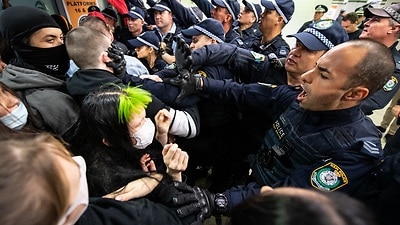The SMH has reported:
NSW Health Minister Brad Hazzard says the Black Lives Matter protest was an isolated event and pleaded with the community to continue following the state's public health rules.
Mr Hazzard said the protest was "approved by the Court of Appeal (COA) in a set of specific circumstances" but warned health officials remained very concerned that COVID-19 was "still amongst us".
"For that reason, the NSW government implores the community to stay with us on the journey to keep all of us safe from the virus that is still wreaking havoc on communities overseas," he said.
Contrary to what Hazzard has had to say, the COA made it clear that it was not concerned with the evidence of COVID19 contagion, including the affidavit of the NSW chief health officer, Kerry Chant.
NSW Health Minister Brad Hazzard says the Black Lives Matter protest was an isolated event and pleaded with the community to continue following the state's public health rules.
Mr Hazzard said the protest was "approved by the Court of Appeal (COA) in a set of specific circumstances" but warned health officials remained very concerned that COVID-19 was "still amongst us".
"For that reason, the NSW government implores the community to stay with us on the journey to keep all of us safe from the virus that is still wreaking havoc on communities overseas," he said.
Contrary to what Hazzard has had to say, the COA made it clear that it was not concerned with the evidence of COVID19 contagion, including the affidavit of the NSW chief health officer, Kerry Chant.
As the COA put it:
Where we differed from the primary judge was in the view that we took of the circumstances in which the Notice of Intention was modified in the course of the week leading up to the proposed assembly, and the legal significance of that modification.
It follows from what has already been said that identification of the statutory context in which public assemblies and rallies may be held in New South Wales is of first importance in understanding both the decision at first instance and our subsequent decision on appeal.
In lay terms this was the equivalent of saying COVID19 contagion and its consequences, including death, were not not relevant; what mattered was whether the proper form had been adhered to.
The COA's decision had nothing to do with the right to protest or anything like that.Again in the words of the COA:
Competing public interests of great importance were thus potentially engaged but, as we shall explain, the issues before this Court were very narrow. Our decision did not ultimately turn on a difficult weighing exercise that resolution of that competition would necessarily have required.
The COA has ignored the advice of NSW chief health officer, Kerry Chant.So can we, the rest of NSW.
END
TO BE READ WITH
TO BE READ WITH
Monday, June 8, 2020



